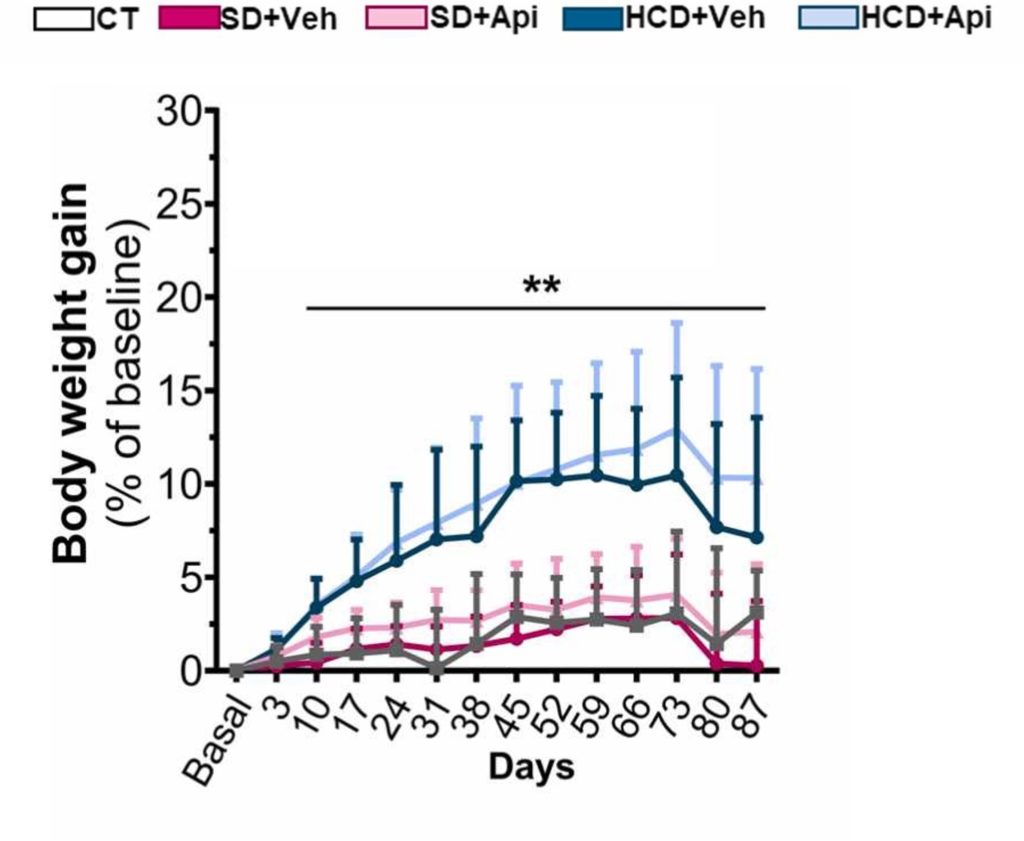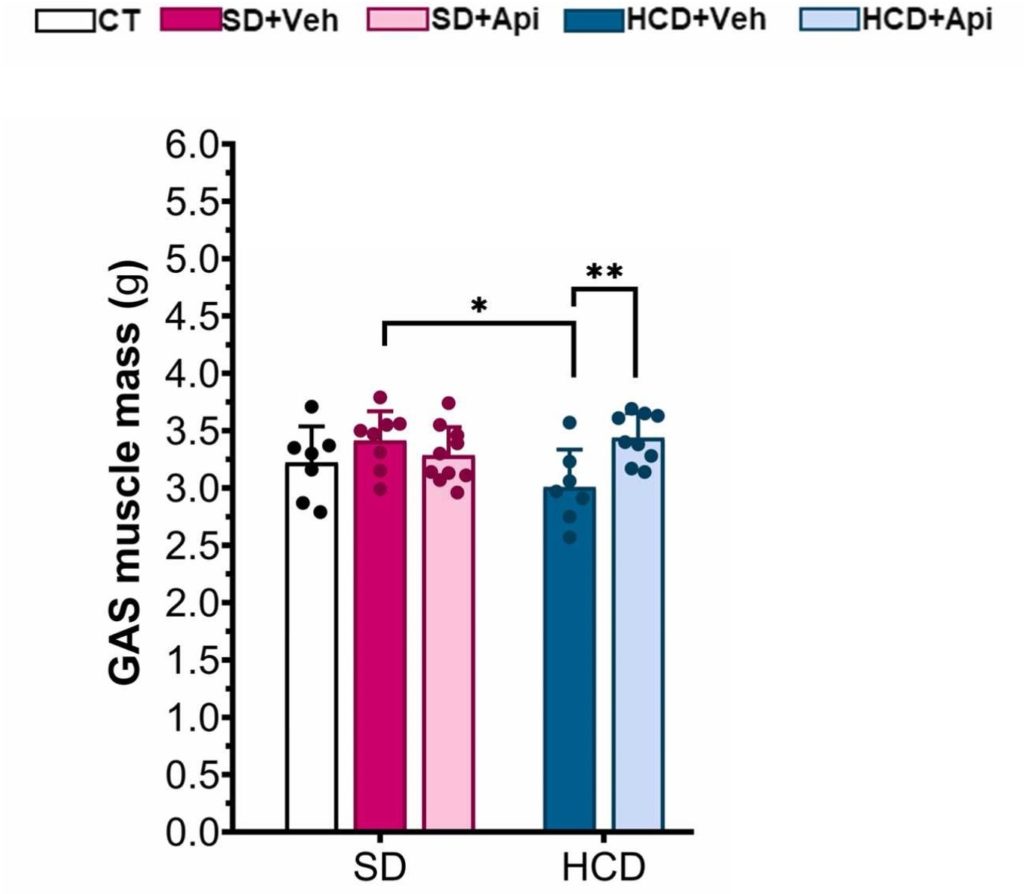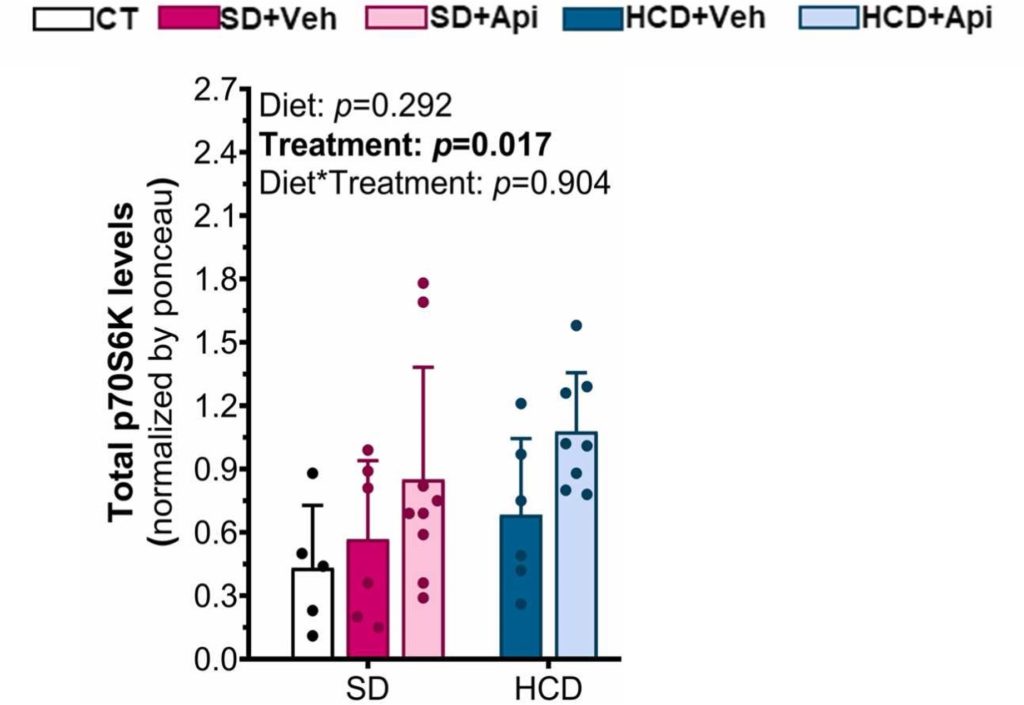New Research: Apigenin Prevents Muscle Shrinkage from Aging & Weight Gain
Apigenin, a natural compound found in plants like chamomile, prevents muscle loss in obese middle-aged rats.
Highlights
- Apigenin prevents calf muscle shrinkage induced by a high-calorie diet.
- Apigenin does not prevent weight gain induced by a high-calorie diet.
- Apigenin elevates a protein associated with anabolic (muscle-building) processes.
Scientists are tirelessly searching for ways to mitigate the health challenges that accompany aging and obesity. One such challenge is sarcopenia, the age-related loss of muscle mass and strength, which is often exacerbated by obesity. Offering a glimmer of hope, scientists in Brazil have discovered that a naturally occurring compound called apigenin may preserve muscle mass in the face of aging and obesity.
Apigenin Prevents Muscle Loss in Middle-Aged Obese Rats
The researchers embarked on a meticulously designed study using middle-aged male rats. These rats, roughly equivalent in age to 53-year-old humans, were divided into several groups. Some were fed a standard diet, while others were given a high-calorie diet (HCD) rich in saturated fat and sucrose, a diet designed to mimic the typical Western diet that often leads to obesity. Crucially, some of the HCD-fed rats received 50 mg/kg/day of oral apigenin, while others received a placebo.
After 12 weeks, the results were striking. As expected, the rats on the HCD developed significant signs of obesity, including substantial weight gain, increased body fat (both visceral and subcutaneous), and elevated levels of blood sugar and triglycerides, hallmarks of metabolic dysfunction. Furthermore, these obese rats showed signs of cardiac hypertrophy, an enlargement of the heart, indicating stress on the cardiovascular system.

Perhaps most concerning for the aging adults with obesity, the HCD-fed rats exhibited clear evidence of sarcopenia. Their gastrocnemius muscles (a major calf muscle) had reduced mass and increased scarring (fibrosis), essentially showing signs of muscle aging. This is where apigenin entered the narrative with a fascinating twist. While the apigenin treatment did not prevent the rats from becoming obese or developing metabolic disturbances, it had a positive impact on muscle health. The rats receiving apigenin, despite being obese, showed significantly mitigated muscle loss.

Molecular Underpinnings Point to mTOR Signaling
To understand how apigenin exerts its protective effects on muscle, the researchers delved into the molecular machinery within muscle cells. They found that apigenin significantly elevated a protein called p70S6K in the gastrocnemius muscle of both obese and non-obese rats. p70S6K is part of the mTOR signaling pathway, crucial in regulating anabolic (muscle-building) pathways. By boosting p70S6K levels, apigenin appears to stimulate the synthesis of new proteins to maintain muscle mass.

This finding is particularly exciting because it points to a specific mechanism through which apigenin can combat muscle atrophy. While it didn’t prevent the accumulation of fat or the metabolic imbalances associated with obesity, it directly intervened in the processes that lead to muscle degradation. This suggests that apigenin could be a valuable therapeutic agent for sarcopenia, especially in individuals who are also struggling with obesity or who are on high-calorie diets.
Broader Implications
Apigenin is a flavonoid found abundantly in everyday foods like parsley, chamomile, and oranges. It has long been recognized for its anti-oxidant, anti-inflammatory, and even anti-cancer properties. But its potential role in combating the dual threats of obesity and muscle atrophy has remained understudied. With this in mind, the implications of this research are potentially far-reaching.
As our population ages, sarcopenia is becoming an increasingly prevalent and debilitating condition, leading to reduced mobility, increased risk of falls, and a diminished quality of life. When combined with the global obesity epidemic, the problem becomes worse. While this research was conducted in a preclinical setting using rats, the findings provide a strong foundation for future human studies.
If similar effects are observed in humans, apigenin could become a valuable dietary supplement or even a pharmaceutical agent to help preserve muscle mass and function in older adults, particularly those who are overweight or obese. Of course, it’s important to remember that apigenin is not a magic bullet. The study clearly showed it did not prevent obesity itself. This underscores the continued importance of a balanced diet and regular exercise for overall health.
Model: Middle-aged male Wistar rats fed excess calories to induce obesity
Dosage: 50 mg/kg/day of apigenin mixed with hazelnut cream for 12 weeks

